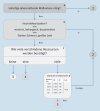["Prioritization and triage" in the context of cardiovascular diseases : Rational organization of safe care during and outside the corona pandemic]
- PMID: 34143249
- PMCID: PMC8212081
- DOI: 10.1007/s00108-021-01079-w
["Prioritization and triage" in the context of cardiovascular diseases : Rational organization of safe care during and outside the corona pandemic]
Abstract
Since the beginning of 2020 the coronavirus disease 2019 (COVID-19) pandemic has extensively impacted medical care in Germany and worldwide. Germany is currently facing the so-called third wave of the COVID-19 pandemic. This is exacerbated by emerging severe acute respiratory syndrome coronavirus 2 (SARS-CoV-2) mutants with increased virus transmission and severe courses of disease. Rising numbers of SARS-CoV‑2 infections translate into an increasing number of severe COVID-19 cases requiring intensive care, which interacts with limited structural and personnel resources for COVID-19 and non-COVID-19 critically ill patients. Therefore, prioritization and triage for critically ill patients with allocation of intensive care capacities becomes necessary, as with all situations with higher strain on capacities. Both strategies are meaningful forms of organization and are not to be equated with a collapse of medical care. Cardiovascular comorbidities and cardiac involvement in COVID-19 are of particular importance for disease severity and the clinical course. In addition to the medical care of patients with SARS-CoV‑2 infections due to the pandemic, other patients with acute sometimes life-threatening diseases must also continue to receive high-quality treatment. This article provides a current overview of proposed restructuring measures in German hospitals as well as the accompanying triage and prioritization algorithms. Moreover, it is necessary to adapt existing treatment algorithms to the pandemic situation. Due their special importance this is sketched using cardiovascular diseases as an example.
Seit Anfang des Jahres 2020 hat die durch die „coronavirus disease 2019“ (COVID-19) verursachte Pandemie weitreichende Folgen für die medizinische Versorgung in Deutschland und weltweit. Aktuell befindet sich Deutschland in der sog. 3. Pandemiewelle. Dazu kommen Mutanten des „severe acute respiratory syndrome coronavirus 2“ (SARS-CoV-2) mit erhöhter Virustransmission und schwerem Erkrankungsverlauf. Steigende SARS-CoV-2-Infektionszahlen münden in einer erhöhten Zahl schwerer COVID-19-Verläufe und einem erhöhten Bedarf intensivmedizinischer Behandlungen, die auf begrenzte strukturelle und personelle Ressourcen für COVID-19- und Non-COVID19-Patienten treffen. Dies – wie alle Situationen mit hoher Kapazitätsbelastung – macht eine Triagierung und Priorisierung von Erkrankten mit Zuteilung intensivmedizinischer Kapazitäten notwendig. Beide Strategien sind sinnvolle Organisationsformen und dürfen nicht mit einem Zusammenbruch der medizinischen Versorgung gleichgesetzt werden. Kardiovaskuläre Komorbiditäten und eine kardiale Mitbeteiligung bei COVID-19 sind für die Krankheitsschwere und den Krankheitsverlauf von besonderer Bedeutung. Neben der medizinischen Versorgung der Patienten mit pandemiebedingten akuten SARS-CoV-2-Infektionen müssen auch andere Patienten mit akuten, u. U. lebensbedrohlichen Erkrankungen unverändert mit hoher Qualität versorgt werden. Dieser Beitrag gibt eine aktuelle Übersicht über die vorgeschlagenen Restrukturierungsmaßnahmen in deutschen Krankenhäusern sowie damit einhergehenden Triagierungs- und Priorisierungsalgorithmen. Daneben ist es erforderlich, bestehende Behandlungsalgorithmen an die pandemische Lage zu adaptieren; dies wird aufgrund ihres besonderen Stellenwerts exemplarisch an kardiovaskulären Erkrankungen skizziert.
Keywords: COVID-19; Decision aids; Health care rationing; Health resources; Intensive care medicine.
Similar articles
-
[Triage recommendations of the specialist societies : Background, summary and comments].Chirurg. 2021 Feb;92(2):128-133. doi: 10.1007/s00104-021-01354-4. Epub 2021 Jan 28. Chirurg. 2021. PMID: 33511439 Free PMC article. Review. German.
-
Recommendations on COVID-19 triage: international comparison and ethical analysis.Bioethics. 2020 Nov;34(9):948-959. doi: 10.1111/bioe.12805. Epub 2020 Sep 25. Bioethics. 2020. PMID: 32975826 Free PMC article.
-
[Health professionals facing the coronavirus disease 2019 (COVID-19) pandemic: What are the mental health risks?].Encephale. 2020 Jun;46(3S):S73-S80. doi: 10.1016/j.encep.2020.04.008. Epub 2020 Apr 22. Encephale. 2020. PMID: 32370984 Free PMC article. French.
-
[Effects of the SARS-CoV-2 pandemic on the otorhinolaryngology university hospitals in the field of medical care].Laryngorhinootologie. 2020 Oct;99(10):694-706. doi: 10.1055/a-1232-4911. Epub 2020 Aug 6. Laryngorhinootologie. 2020. PMID: 32767296 Free PMC article. German.
-
[Obstetric Anesthesia During the SARS-CoV-2 Pandemic - a Brief Overview of Published Recommendations for Action by National and International Specialist Societies and Committees].Anasthesiol Intensivmed Notfallmed Schmerzther. 2020 Apr;55(4):266-274. doi: 10.1055/a-1144-5562. Epub 2020 Apr 9. Anasthesiol Intensivmed Notfallmed Schmerzther. 2020. PMID: 32274774 Free PMC article. Review. German.
Cited by
-
[COVID-19: Learning from experience].Internist (Berl). 2021 Jul;62(7):695-696. doi: 10.1007/s00108-021-01089-8. Epub 2021 Jul 6. Internist (Berl). 2021. PMID: 34228149 Free PMC article. German. No abstract available.
References
Publication types
MeSH terms
LinkOut - more resources
Full Text Sources
Medical
Miscellaneous






